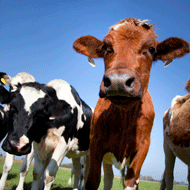
Improving the detection and control of disease in cattle
Liverpool scientists are heading up a £1 million project to tackle liver fluke - a disease that costs the UK economy £300 million each year.
Researchers from the University of Liverpool will look at methods to improve the detection and control of liver fluke in cattle.
The disease is found on 75 per cent of UK dairy farms and causes weight loss, lethargy and anaemia in cattle.
Professor Diana Williams, a veterinary pathologist from the university's Institute of Infection and Global Health says the disease is on the rise due to climate change and changes in farming practices.
"It is fast becoming difficult to treat because of growing resistance to medication," she explains.
Scientists are joining forces with the farming industry to undertake the four-year research project.
Prof Williams said: "We will look at husbandry practices and physical and environmental factors from a study of 250 farms to feed into statistical and mathematical models that will help us determine more effectively why some farms have fluke whilst others in close proximity do not."
Scientists will also aim to improve drug treatments at particular times in the year to help slow the development of drug resistance.
In addition, as the disease is transmitted by the dwarf pond snail, the team will create a system to categorise snail habitats. These will then be used alongside satellite imagery for individual farms.



 HMRC has invited feedback to its communications regarding the employment status of locum vets and vet nurses.
HMRC has invited feedback to its communications regarding the employment status of locum vets and vet nurses.